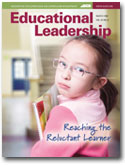In response to "The College Question" (posted Jan. 16, 2008), which asked, Is our K–12 education system too focused on preparing all kids for college, at the expense of preparing them for life?
Certainly, we need to prepare students for postsecondary options. However, we should stop treating high school as a stopgap between middle school and college with no purpose of its own in preparing students for life.
—Marlene
I look forward to the day when high schools will brag about the number of graduates who don't go on to college. The current college-preparatory curriculum is useless in the work world.
—Larry Schlack
It is time we took a close look at the damage being done to our students by emphasizing that college = success. Look at Bill Gates and others who either did not attend college or dropped out before completing their studies. College is not the only pathway to success, and it is time that politicians and educators acknowledged this fact!
—Janet
I teach at a charter school where 70 percent or more of the students are not reading at grade level. Many of the older kids (grades 6–8) are reading at a 2nd or 3rd grade level. Those students need to learn specific skills that will help them learn a trade or get a job. College could be in their future someday, but right now they are struggling to catch up.
—McFarland
Our push to focus high school on preparing kids for college has already snapped back to bite us. We have effectively convinced an entire generation to be disdainful of any type of work that requires effort, persistence, and getting their hands dirty. Students are graduating from high school terrifyingly unprepared to step into the outside world because all they have been trained to do is take more classes. It is time to take a more balanced approach and give students multiple opportunities for experiences and training.
—Mercedes
Preparing students for life reaches beyond careers and vocational training programs. Perhaps the K–12 system (especially at the middle and high school levels) should examine how it can loosen the chains of departmentalization and allow the students freedom to gain knowledge and skills through a seamless, integrated approach.
—Mary
Students thrive on feeling successful, and I know that some of my 11- and 12-year-old students will not be successful in a high school that forces all students to take the same, higher-level math courses. I am not saying that we should lower the expectations for some students, but as a working professional, I have never once needed to rely on my trigonometry training. I do, however, rely on my communication skills. We need to step back and look at our students as individuals and ask how we can prepare each one for the future.
—Katherine Pryor
The educational system has succumbed to the pressures of society and is now viewed as a business. Case in point, in my school district in Southern California, we are experiencing a severe decline in student enrollment. Districts are now competing for students. Our latest marketing campaign promotes our "college culture" and how we successfully prepare students (starting as early as kindergarten) to enter college. We are supporting the myth that college = success. Wouldn't my district have an advantage over others if our marketing campaign promoted diverse programs that led to different opportunities after high school? In the end, I guess, having options other than college doesn't pay off for the district.
—Lorena
I find it interesting that high schools are becoming more focused on preparing students for college while universities are commenting on the declining quality of their applicants. They specifically note that students' writing skills are deteriorating. What is going wrong? My guess is that the focus on standardized tests makes students worry only about how to choose among the four provided answers. Perhaps more focus should be put on reading, writing, and computation for real-life activities, rather than for standardized tests.
—Melissa
As a recent college graduate, I feel that I am completely unprepared for the real world. I was trained to know how to take more classes. I attended college for about 10 years off and on with no idea where I was headed and what I was headed toward. Finally, I realized that I was meant to be a teacher, to possibly help my students feel more prepared for the world, whether it be college or not.
—Stephanie
Look for the May 2008 issue of EL for more on Reshaping High Schools.
